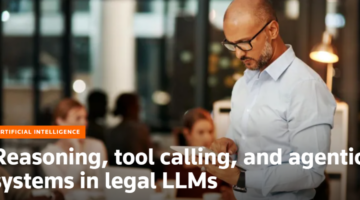
Last week, Microsoft announced an AI Diagnostic Orchestrator tool for the diagnosis of complex cases that often require several specialists to resolve. Certainly, there are plenty of differences between legal and medical problems. But both systems have become bloated, expensive, and hard to access regardless of economic status. Tools like Microsoft’s new offering could help bridge that gap as well as improve the quality of legal services.
The Microsoft Tool
Microsoft says its tool nailed diagnoses in 85% of NEJM cases. Human doctors? Approximately 21%. That’s nearly four times worse than the Diagnostic Orchestrator. And at a fraction of the cost. That matters since, according to an article in ZD Net about the Microsoft announcement, there are over 50 million health care GenAI searches every single day. (I confess, I’ve made inquiries of ChatGPT from time to time.) By weeding out cases for which health care is not needed, the tools can save a lot of time, energy, and money all the way around. (The ZD Net article was authored by Radhika Rajkumar.)

Reasoning, Tool Calling, And Agentic Systems In Legal LLMs
Domain-specific AI provides accuracy and reliable legal reasoning.
But it’s not just what the Orchestrator does that’s interesting. Since complex medical cases can’t be solved by memorization, Microsoft created a process called a Sequential Diagnostic Benchmark. Sequential diagnosis is the process by which doctors first evaluate the symptoms of a patient and then proceed with tests and further questions. By pairing the Benchmark with LLMs, Microsoft says the LLM becomes a virtual panel of physicians with diverse diagnostic approaches to collaborate to solve the case.
The tool also suggests tests that may be needed to assist it in making an accurate diagnosis and it provides a risk benefit and cost analysis for each test that it contemplates. This feature would come in pretty handy given the high cost of medical care (although I shudder what application of this tool by insurance carriers could auger).
Application to Legal?
So, you say that’s all well and good for medical diagnoses that are based on science, but it couldn’t be done for legal, right? Legal problems require experience and wisdom to be analyzed correctly, right? Maybe.

Paying for Law School in 2025: A Straight-Talk Playbook
Juno has consistently secured the best private loan deals for students at the Top MBA programs since 2018—now they’re bringing that same offer to law students, at no cost. Students can check their personalized offers at juno.us/atl This article is for general information only and is not personal financial advice.
On the front end though, think about the cost savings and peace of mind a legal tool like Microsoft’s Diagnostic Orchestrator could deliver for everyday legal questions, questions that already are being routinely answered by tools like ChatGPT. A tool like the AI Diagnostic Orchestrator would also enable more sophisticated problems to be analyzed and sorted through by the client and lawyer who could then make more informed decisions. It could help determine when a lawyer would be needed, what speciality would be required, and even who best to hire.
And creating a tool that can not only pass the bar exam by memorizing facts but could reason through more complex legal problems and apply a sequential-diagnosis-like analysis might do to better inform the public and even in-house counsel of likely outcomes and advice just as if there was a virtual panel of lawyers with diverse approaches. Such a tool could be used to sort through the various strategic options and provide a breakdown of the risks and benefits.
And finally, and perhaps most importantly, a tool that could recommended what steps might be needed to solve a legal problem along with a cost/benefit analysis could likewise inform everyone of what strategy they would like to employ in an informed manner. A tool that could assess the costs of taking a particular deposition and the risks versus benefit of that depo could be pretty valuable. Or one that makes a similar assessment of the advisability of filing certain motions.
Certainly, a lawyer and the client still need to be the final decision maker. But shouldn’t the lawyer be expected to say to the client here’s the cost, here’s the benefit, and here’s the risk, particularly if backed by sound data analytics and analysis.
No question that this is a different approach and it’s sometimes risky to think of borrowing an approach used in one profession for use in another. But legal could look to the medical profession to deal with many of our problems, particularly access to justice and its cost.
The Medical Approach v. Legal
When you have a medical problem today, you typically don’t see a physician, at least at first. You see a nurse practitioner or physician’s assistant who makes the initial assessment to aid the doctor. Often this assessment will rule out the need for a doctor at all.
And these days, doctors don’t take vitals or run basic tests. Trained specialists handle that, efficiently and at lower cost. (We don’t call them “non-doctors,” by the way.)
Why Not Legal
So, the notion of AI tools to assist with some part of the work needed to resolve a legal problem certainly has some valuable applications to legal. And tools like those developed by Microsoft are just an additional component of the disaggregation of work similar to what the medical field has done. Our medical systems and our legal systems need tools to reduce cost and democratize the services that are needed.
Is legal ready for an AI Diagnostic Orchestrator? Maybe not. But don’t be surprised if Microsoft builds one anyway.
Stephen Embry is a lawyer, speaker, blogger and writer. He publishes TechLaw Crossroads, a blog devoted to the examination of the tension between technology, the law, and the practice of law.